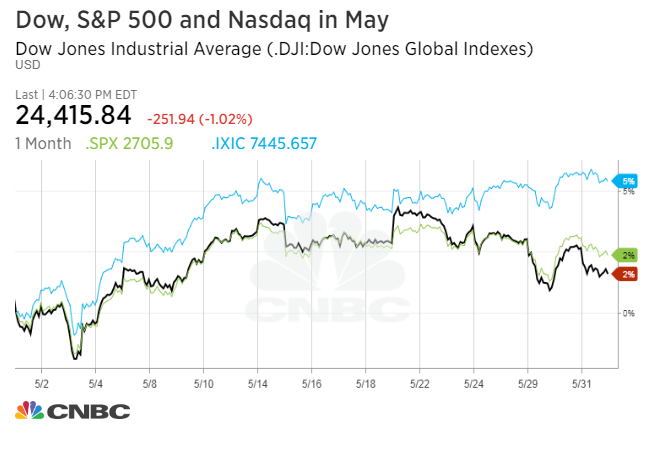
Stocks fell on Thursday after President Donald Trump slapped tariffs on the European Union, Mexico and Canada, sparking fears the U.S. could enter a trade war with some key partners.
The Dow Jones industrial average dropped 251.94 points to close at 24,415.84, with Boeing contributing the most losses to the index. The S&P 500 declined 0.7 percent to 2,705.27 as consumer staples lagged. The Nasdaq composite, meanwhile, pulled back 0.3 percent to 7,442.12.
The Trump administration said tariffs on steel and aluminum imports from EU, Canada and Mexico will take effect at midnight Thursday. The EU followed up the U.S. announcement by saying it would impose countermeasures of its own, while Canada Foreign Minister Chrystia Freeland said the country plans to slap dollar-for-dollar tariffs on the U.S.
Mexico responded to the measures by saying it would impose tariffs on apples, pork bellies, and flat steel imported from the U.S.
Metal producers in the countries affected had been granted a temporary exemption from the tariffs earlier this year, but they are set to expire Friday. The tariffs were originally announced on March 1.
“If you would’ve seen these headlines two to three months ago, the market would be doing much worse,” said John Zaller, chief investment officer at MAI Capital Management. “I think that’s a consequence of the market thinking this is a negotiating tactic.”
“Unfortunately, it brings a lot of uncertainty,” he said. “We’d love to see this resolved sooner rather than later.”
The Mexican peso hit its lowest level against the dollar since early March amid the news. Mexican stocks also fell, with the iShares MSCI Mexico exchange-traded fund (EWW) sliding 1.1 percent. The iShares MSCI Canada ETF (EWC) pulled back 0.5 percent.
Boeing and Caterpillar — two companies that are vulnerable to trade tensions given the large amount of business they do overseas — fell 1.7 percent and 2.3 percent, respectively.
The move lower in stocks Thursday followed a sharp move higher in the previous session. On Wednesday, concerns surrounding Italy’s political crisis showed signs of abating. The Dow gained more than 300 points while the small-caps Russell 2000 index notched a record high.
In recent days, markets around the globe have been on edge over concerns surrounding the euro zone’s third-largest economy, Italy. Investors have been fretting over the possibility of snap elections, and whether the country’s involvement in the European Union and the euro currency will be called into question. News surrounding fresh efforts to form a government have helped alleviate fears over the past day.
“What Italy represented was a minor earthquake and the market quickly rebounded,” said Robert Pavlik, chief investment strategist at SlateStone Wealth. “If you look at Italy — the third-largest euro zone economy — [ECB President Mario Draghi] will not let them fall.”
Thursday also marked the last day of the month. For May, the Dow and S&P 500 rose 1.1 percent and 2.2 percent, respectively. The Nasdaq, meanwhile, advanced 5.3 percent.

Meanwhile in economic news, the Commerce Department said consumer spending jumped 0.6 percent last month, the biggest gain in five months. The department also said the personal consumption expenditures (PCE) price index — the Federal Reserve’s preferred measure of inflation — rose 0.2 percent in April.
In corporate news, General Motors shares shot up 12.9 percent after the company said the SoftBank Vision Fund will invest $2.25 billion in the automaker’s self-driving cars.























